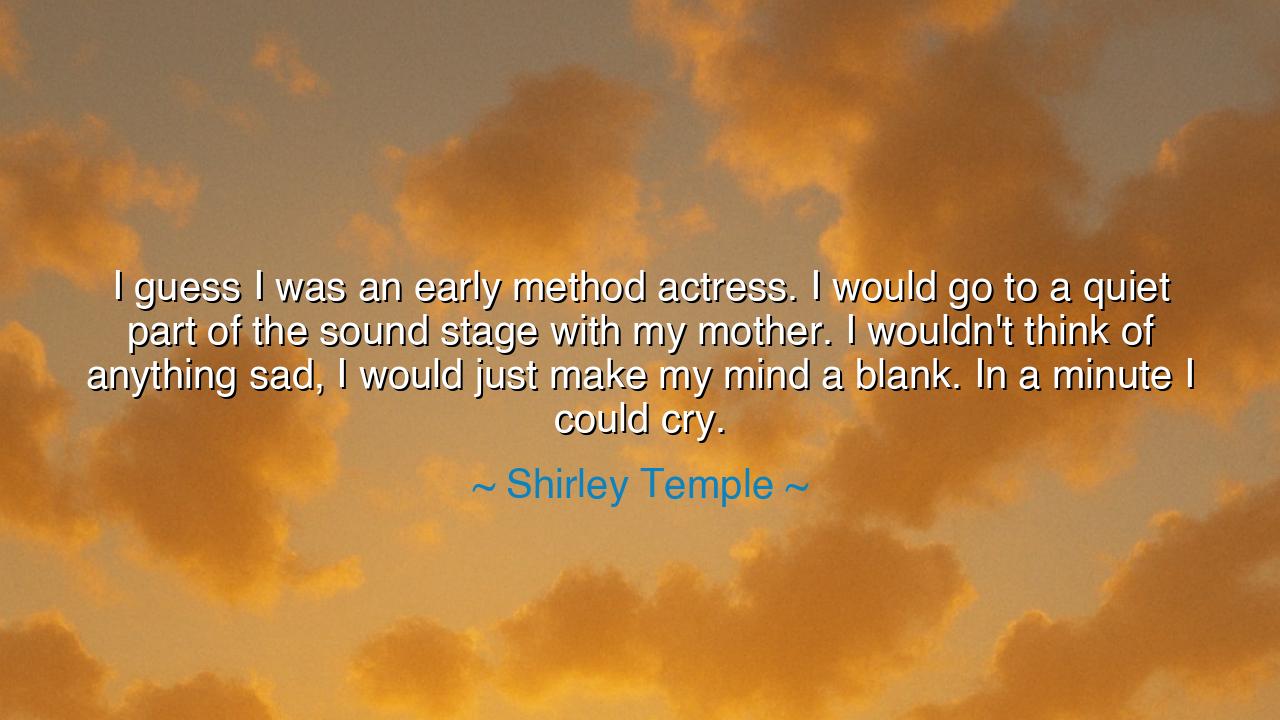
I guess I was an early method actress. I would go to a quiet part
I guess I was an early method actress. I would go to a quiet part of the sound stage with my mother. I wouldn't think of anything sad, I would just make my mind a blank. In a minute I could cry.






When Shirley Temple said, “I guess I was an early method actress. I would go to a quiet part of the sound stage with my mother. I wouldn’t think of anything sad, I would just make my mind a blank. In a minute I could cry,” she revealed the mystery of innocence and discipline bound together in one small soul. Behind her childlike sweetness was a mind already shaped by the craft of feeling—a mastery born not of pain, but of focus. Her words remind us that emotion, when summoned from stillness rather than turmoil, becomes pure. To “make the mind a blank” is to open the gate between the human and the divine—to let truth flow unforced, like tears that need no reason.
Shirley Temple, a child of light in the darkness of the Great Depression, was no ordinary performer. Her smile was hope itself to millions, yet this quote unveils a quieter wisdom: that her artistry came not from imitation, but from deep inner stillness. Even as a child, she understood that emotion cannot be commanded—it must be invited. By emptying her thoughts, she created space for authenticity. In that sacred emptiness, she could cry not from sadness, but from presence—a state the ancients might have called harmony of the soul.
In ancient philosophy, such mastery of feeling was revered. The Stoics taught that to govern one’s emotions was to be free, not by denying feeling, but by guiding it. Epictetus would have recognized in young Shirley a mind that had already glimpsed this truth: when one clears the mind of noise, the heart speaks clearly. Her ability to cry without sorrow was not falsehood—it was art in its highest form, where empathy replaces experience, and imagination becomes reality. This is the power of the artist—to live many lives within one body, yet never lose the self.
But there is also a melancholy beauty in her words. For what kind of childhood is it, when tears are practiced rather than spontaneous? To cry on cue is to carry both gift and burden—to be young and yet ancient, innocent yet disciplined. Like a temple dancer who learns grace before freedom, Shirley Temple’s early life reminds us that talent can demand sacrifices unseen by the audience. Even as she played the symbol of joy, she practiced control. In her “blank mind” we hear the echo of solitude, the stillness of a child who had learned to feel deeply while guarding her own heart.
There are other souls in history who mastered such balance between innocence and art. Mozart, composing music at the age of five, did not yet know sorrow, yet his melodies carried eternity within them. Joan of Arc, though still a child when she heard divine voices, spoke with the conviction of ages. Such beings seem touched by something greater—born not to play at life, but to reflect its mystery. Shirley Temple’s quiet control, her ability to touch hearts without personal grief, places her among these rare spirits who remind us that truth can emerge even from artifice, and that purity of intention can move mountains more than experience itself.
The meaning of her quote, then, lies in the paradox of control and surrender. By making her mind a blank, she did not suppress emotion—she made room for it. She teaches us that the path to genuine expression begins not with struggle, but with stillness. In a world that rushes to feel, to react, to overflow, she reminds us of the sacred pause—the moment when one clears away thought and allows truth to rise, gentle and unforced, like a tear upon the cheek.
From her example, let this lesson endure: when life demands authenticity, do not reach for memories of sorrow—reach for stillness. Let the clutter of thought fall away until only the soul remains. Whether in art or in living, learn to dwell in silence long enough for truth to find you. For in that space—where the mind is blank and the heart is open—you will discover, as Shirley Temple did, that even the smallest voice can move the hearts of nations, and even the simplest tear can become eternal.






AAdministratorAdministrator
Welcome, honored guests. Please leave a comment, we will respond soon